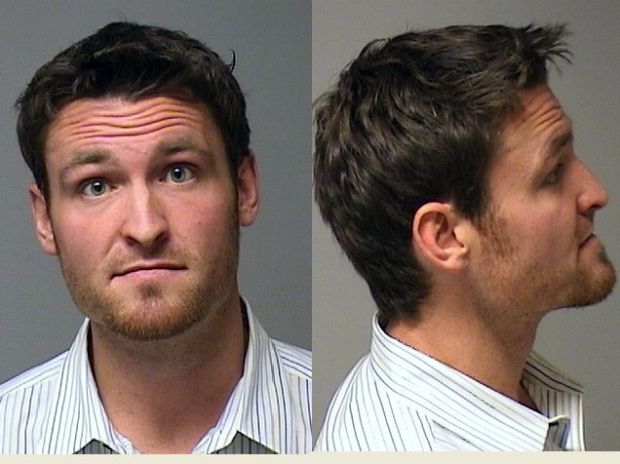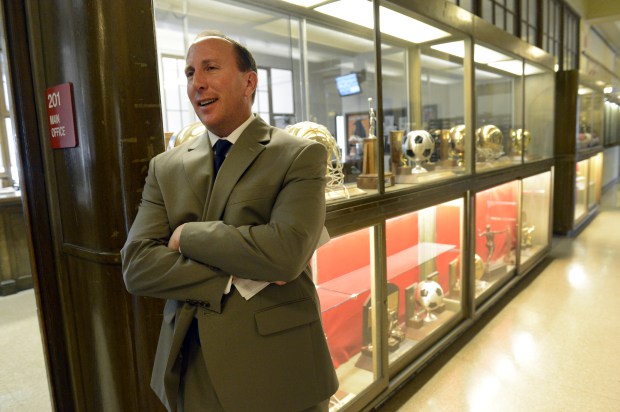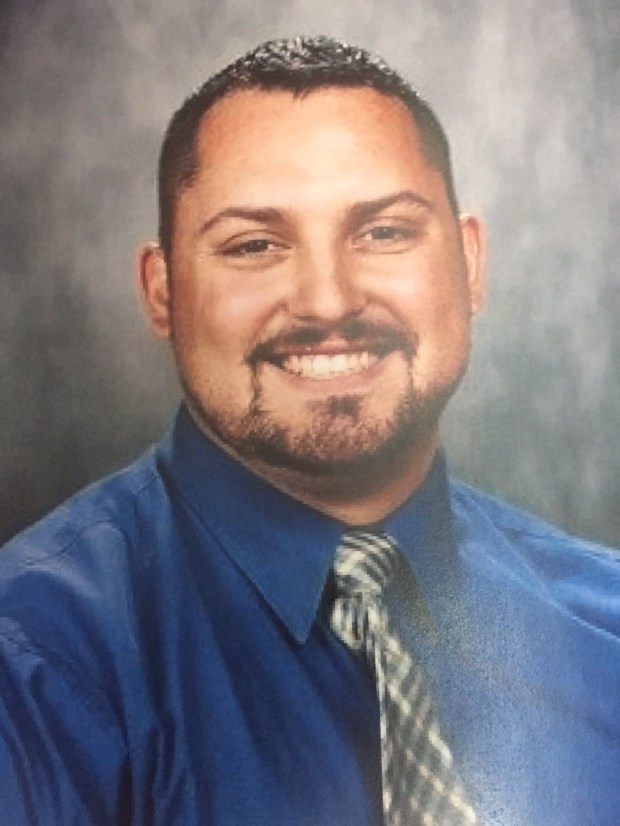Colorado Public Schools Are Paying Millions to Settle Lawsuits When Educators Fail to Report Sex Abuse of Students, but Those Educators Avoid Legal Consequences
By Christopher N. Osher
The principal caught an incriminating sight when she walked by the classroom: The male math teacher was sitting provocatively close to the 13-year-old student perched on his desk wearing a short skirt. But the principal did nothing other than warn the teacher, after the student exited, to act more professionally. Throughout the spring of 2011, rumors flew around the hallways at Rocky Heights Middle School in Highlands Ranch about the teacher, Richard “Rick” Johnson, and young girls. After Johnson plastered his office walls with photos of another eighth-grade girl he liked to hug, students talked about how he must be having sex with her. At least three students and two parents told school administrators that Johnson was cultivating an inappropriate relationship with the student, but the officials continued to sit on the information, according to documents in a federal lawsuit. Not until parents went to police was Johnson investigated, charged and convicted of raping a 14-year-old girl he began showering with affection the year before. A key state law is supposed to defend Colorado’s vulnerable children in such instances. The law classifies school authorities, teachers, clergy and more than 40 other professions as “mandatory reporters,” who are required to alert police or child-protection workers to any suspected physical or sexual abuse of children.
But, as was the case at Rocky Heights, the law is too often ignored. An investigation by The Denver Post found that the mandatory reporting law is seldom enforced and often results in leniency for violators. Those convicted of the law face a penalty as low as a $50 fine. While criminal penalties have been light, legal proceedings have raised questions about how seriously school districts take their mandatory reporting obligations. At least three lawsuits accusing school authorities in Colorado of ignoring mandatory reporting requirements resulted in settlements, one of which cost $1.4 million. “If a child tells you they have been harmed, sexually assaulted or raped, you should say it’s not your fault and call the police, but instead we have some mandatory reporters who understand the law and how they can sweep it under the rug and deny justice for those who have been victimized,” state Sen. Rhonda Fields, a Democrat from Aurora, said this year at a legislative hearing in which she failed to persuade other legislators to join her effort to bolster Colorado’s mandatory reporting law. Since 2010, prosecutors have brought just 46 criminal cases of failing to act as a mandatory reporter, a review of state judicial data shows. Only about half of those cases resulted in a conviction. And of those that did, virtually all of the convictions eventually were dismissed by a judge after the defendant served a short stint on probation. The harshest penalties were handed out in 2015 to two Longmont church pastors — Walter Roberson and Robert Young — who were given the option of serving 10 days in lockup or doing work release. They were convicted in what prosecutors described as a coverup for failing to report allegations from a woman that she had been raped at the age of 14 by a youth pastor, who was the son of Roberson. Two other elders at the church received lesser sentences for their failures as mandatory reporters in that case. More typical is what occurred when Colorado Springs police in 2011 discovered failures in mandatory reporting at the state-run Colorado School for the Deaf and the Blind. Detectives were called to investigate after a 15-year-old student confessed to a school employee that he had sexually assaulted five students in the previous three years. Police discovered the school’s staff members had been alerted by some of the victims and their parents of the alleged sexual abuse, but those reports hadn’t been forwarded to law enforcement, court records show. The shocked detectives also found significant confusion among school personnel about the mandatory reporting law. Several staffers said they hadn’t alerted police because they thought they had an obligation to keep confidential the names of students accused of sexual acts because they were juveniles. In the end, only the former principal, Louis Tutt, was charged with failure to report, but he never had to appear in court. His charges were dismissed because he had moved out of state. In 2016, a $1.4 million settlement brought an end to lawsuits filed on behalf of two the five victims who alleged mandatory reporting failures at the Colorado School for the Deaf and the Blind. One of the victims, who was 9 at the time and struggled with cerebral palsy, had been sexually assaulted in a school bathroom by the older student. The other victim, 15 at the time, was repeatedly sexually abused at school by the same assailant, including being forced to perform oral sex. “Schools and school districts like the Colorado School for the Deaf and the Blind go through training on mandatory reporting requirements, but when it comes time to act on it, it appears that oftentimes they want to do their own investigation instead of reporting it, or officials minimize what the person has reported,” said Steve Baity, one of the lawyers who filed the suit for the two blind victims. How training is conducted for mandatory reporters throughout the state remains a concern for Stephanie Villafuerte, Colorado’s child protection ombudsman, the state’s watchdog for the child-protection system. “What’s interesting to me is that we have more than 40 different mandated reporters in Colorado and yet we don’t mandate any training for those same reporters,” Villafuerte said. A 2015 survey by the Colorado Department of Human Services, part of a campaign to increase public awareness about child abuse, found that 70 percent of mandatory reporters didn’t even know that they were mandatory reporters. Of those that did, 30 percent of mandatory reporters did not know the proper steps to report child abuse or neglect. To properly report child abuse, child sex trafficking or neglect in Colorado there are three ways. The easiest is to call the Colorado Child Abuse and Neglect hotline 1-844-CO-4-KIDS (1?844?264?5437). Anyone can also call the local county human services department or law enforcement agency or 911 if you are witnessing a child in a life-threatening situation. Villafuerte said mandatory reporters have called her office asking how they are supposed to handle alleged abuse between two juveniles. Such abuse must be reported, just like abuse between an adult and a juvenile, she said. In addition, the law holds individuals responsible for their reporting obligations, which means the obligations aren’t satisfied merely by alerting supervisors. The law requires the individual to report their suspicions to law enforcement or child-protection services, she noted. “You cannot pass on your obligation to report,” Villafuerte said. The Colorado Education Department leaves it up to individual school districts to decide what training to give their personnel on the law — or whether to train them at all. And no surveys are conducted by state officials on how those districts are conducting that training. Two recent cases have renewed questions about whether schools in Colorado are taking their mandatory reporting duties seriously enough.
Denver prosecutors in April filed criminal charges against Andy Mendelsberg, the former principal of East High School, for failure to report that a student had told school officials she had been raped by another student. Also charged with failure to report in that case were vice principal Jann Peterson, deans Jen Sculley and Eric Sinclair, and counselor Anita Curtiss. Court documents allege that the East High girl became the target of relentless bullying from other students aware of her allegations. When the girl sought help from Sculley, the dean told her to move on and that “this is their little secret,” according to one police report. After the girl’s parents decided to pull their child out of school, they met with Mendelsberg, who advised them to take care of the situation by keeping their daughter at the school and finding her a new group of friends, another police report states. The boy was charged with one count of sexual assault after the girl and her parents went to the police on their own. Charges of failure to report also are pending against two Cherry Creek School District leaders –Prairie Middle School principal David Gonzales and assistant principal A.J. MacIntosh — for their conduct regarding allegations that a teacher raped a girl. Charging documents say administrators pressured the alleged victim, a teen, to recant her claim of sexual abuse by Brian Vasquez, a teacher at Prairie. Vasquez has now been charged with sexually assaulting five students.
Cherry Creek School District’s policy manual has a statement on how to handle sexual harassment allegations that appears in at least one respect to be contrary to the law. The policy manual states: “In cases involving potential criminal conduct, a determination will be made as to whether appropriate law enforcement officials should be notified.” But the law requires mandatory reporters to alert police or child-protective workers of allegations of abuse no matter what school administrators determine. The child-protective workers or police — not school administrators — are the ones who determine the sufficiency of the evidence. Defense lawyers in Cherry Creek reporting cases are seeking dismissal of the criminal charges, arguing the statute of limitations has passed. That dispute prompted Fields, the state legislator, to urge her colleagues at the Capitol to change the statute of limitations to five years instead of 18 months. Sen. Vicki Marble, a Fort Collins Republican, questioned during the debate whether the crime of failing to report ought to be raised to a felony. It currently is a misdemeanor, which carries a maximum penalty of six months’ incarceration. The Colorado Catholic Conference and the Colorado Education Association handily beat back Fields’ effort. In the Rocky Heights case, the principal at the time, Patricia Dierberger, and the assistant principal at the time, James McMurphy, instead of alerting police, disciplined the students who told them they thought Johnson was having sex with a student. Two of the students were suspended for “harassing” the teacher. Another was ordered to write a letter of apology to Johnson. Yet the administrators never faced any criminal charges even though a Douglas County sheriff’s investigator determined their inaction violated the mandatory reporting law. It wasn’t until 2012 that the investigator learned from the parents that Johnson was preying on the girl, violations that eventually resulted in a 20-year prison sentence for Johnson. By then, the 18-month statute of limitations for bringing criminal charges for mandatory reporting law violations already had passed, which meant Dierberger and McMurphy could not be charged. Cpl. Detective Dea Aragon, the sheriff’s investigator, expressed frustration in a declaration submitted in a federal lawsuit filed on behalf of the girl Johnson raped. The sheriff’s department had conducted “numerous investigations” of Douglas County School District employees for failing to report sexual abuse, Aragon said in the declaration. For years, the sheriff’s office had been concerned about a culture in which school district employees had not “participated in adequate training regarding sexual abuse of children and did not understand or take seriously their responsibilities to report suspected sexual abuse,” the declaration said. The Douglas County School District had promoted to head of human resources Brian Ewert, who in 2006 drew the ire of sheriff’s officials when he was principal of El Dorado Elementary School. Investigators had charged Ewert with failure to report after they determined he failed to tell them he knew a child-care director at his school had used a pen to draw a smiley face on the butt of one of the children in a rec center locker room. The child-care director, Paul Arriola, was later convicted of sexually assaulting children under his care after children revealed he ran a “tighty whitey club” in which he took photographs of children in their underwear kissing one another in exchange for candy and patted their naked buttocks. “In hindsight you wonder, ‘What should I have seen that I didn’t see?’,” Ewert, now superintendent of Littleton Public Schools, said in a recent interview, adding his criminal charges were dismissed by prosecutors. “Now my advice, in my position, is to never question anything. If you have any question in your head, it doesn’t matter. You just report, and then you leave it to the experts to determine what happened.” Back during the turmoil at Rocky Heights, Aragon, the investigator, confronted McMurphy, the assistant principal, telling him during an interview that he had violated the mandatory reporting law by failing to report Johnson but would not be prosecuted due to the statute of limitations. McMurphy told the investigator he still did not understand the mandatory reporting law even though he had been investigated for a separate violation of the law just six months earlier, Aragon recalled. The former head of security for Douglas County schools, Dan Clemente, testified when deposed that he had quit in disgust due to a lack of support. He testified that among those who refused to take seriously his warnings that they needed to bolster mandatory reporting training was Dierberger, the principal at Rocky Heights. In one heated phone call, Dierberger became “belligerent and disrespectful” and began to yell when Clemente told her she needed to have her staff attend training sessions that covered mandatory reporting, Clemente testified. Those who had dodged the training sessions included McMurphy. Dierberger no longer works for the district. McMurphy was promoted to principal at another school, but he also has since left the district. Neither returned messages seeking comment. The district has made improvements, said Paula Hans, the public information officer. She said the lawsuit filed by the former Rocky Heights student raped by Johnson was settled, but Hans refused to make the terms public. “All employees in the Douglas County School District are required to complete mandatory reporting training each year they are employed with us,” she said in a statement.
|
.
Any original material on these pages is copyright © BishopAccountability.org 2004. Reproduce freely with attribution.



